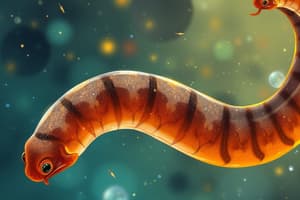Podcast
Questions and Answers
Which subclass of trematoda has adults that are called flukes, are flat and have leaf-like shape?
Which subclass of trematoda has adults that are called flukes, are flat and have leaf-like shape?
- Cestoda
- Turbellaria
- Monogea
- Digenea (correct)
In the life cycle of digenea, what is the final stage of the young fluke called?
In the life cycle of digenea, what is the final stage of the young fluke called?
- Cercaria (correct)
- Redia
- Miracidium
- Metacercaria
Which family of trematodes is important and includes species such as Fasciola hepatica and Fasciola gigantica?
Which family of trematodes is important and includes species such as Fasciola hepatica and Fasciola gigantica?
- Fasciolidae (correct)
- Dicrocoeliidae
- Schistosomatidae
- Paramphistomatidae
What is the intermediate host for the liver fluke Fasciola hepatica?
What is the intermediate host for the liver fluke Fasciola hepatica?
Which genus in the family Dicrocoeliidae has two intermediate hosts, including a land snail and ants?
Which genus in the family Dicrocoeliidae has two intermediate hosts, including a land snail and ants?
Which structure of the digenea parasite is responsible for penetrating the intestine wall of the definitive host?
Which structure of the digenea parasite is responsible for penetrating the intestine wall of the definitive host?
Which family of digenea includes important species such as Fasciola hepatica and Fasciola gigantica, both of which have freshwater Lymnaeid snails as intermediate hosts?
Which family of digenea includes important species such as Fasciola hepatica and Fasciola gigantica, both of which have freshwater Lymnaeid snails as intermediate hosts?
In the life cycle of Dicrocoelium, which organism serves as the intermediate host before ants (formica)?
In the life cycle of Dicrocoelium, which organism serves as the intermediate host before ants (formica)?
Which genus in the family Fasciolidae is responsible for causing liver fluke infections in cattle and pigs, leading to encapsulated or calcified flukes in the liver parenchyma?
Which genus in the family Fasciolidae is responsible for causing liver fluke infections in cattle and pigs, leading to encapsulated or calcified flukes in the liver parenchyma?
What is the final stage of the young fluke called after developing from redia in the life cycle of digenea parasites?
What is the final stage of the young fluke called after developing from redia in the life cycle of digenea parasites?
Flashcards
Digenea fluke shape
Digenea fluke shape
Adult digenetic trematodes are flat, leaf-shaped parasites.
Cercaria (flukes)
Cercaria (flukes)
The final stage of a young fluke in its life cycle.
Fasciolidae family
Fasciolidae family
A family of trematodes including Fasciola hepatica and Fasciola gigantica.
Intermediate host (liver fluke)
Intermediate host (liver fluke)
Signup and view all the flashcards
Dicrocoelium intermediate host
Dicrocoelium intermediate host
Signup and view all the flashcards
Cercaria penetration
Cercaria penetration
Signup and view all the flashcards
Fasciola hepatica intermediate
Fasciola hepatica intermediate
Signup and view all the flashcards
Dicrocoelium first intermediate host
Dicrocoelium first intermediate host
Signup and view all the flashcards
Fascioloides genus
Fascioloides genus
Signup and view all the flashcards
Post-redia stage (flukes)
Post-redia stage (flukes)
Signup and view all the flashcards
Study Notes
Trematoda Subclass and Characteristics
- The subclass of Trematoda known for adults called flukes is Digenea.
- Digenea flukes are characterized by a flat, leaf-like shape.
Life Cycle and Stages
- The final stage of the young fluke in the Digenea life cycle is known as the metacercaria.
- In Dicrocoelium's life cycle, the first intermediate host is a land snail, which then transfers the parasites to ants.
Important Families and Species
- The family Fasciolidae includes significant species like Fasciola hepatica and Fasciola gigantica.
- These liver flukes utilize freshwater Lymnaeid snails as their intermediate hosts.
Hosts and Infection
- The intermediate host for Fasciola hepatica is specific freshwater snails, crucial for their life cycle.
- The genus Dicrocoelium within the family Dicrocoeliidae includes two intermediate hosts: land snails and ants.
- Fasciola, a genus in the family Fasciolidae, is known to cause liver fluke infections in cattle and pigs, resulting in encapsulated or calcified flukes within liver tissue.
Penetration and Mechanism
- The structure used by Digenea parasites for penetrating the intestine wall of the definitive host is the penetration gland.
- After developing from redia in the life cycle of Digenea parasites, the final stage of the young fluke is again referred to as the metacercaria.
Studying That Suits You
Use AI to generate personalized quizzes and flashcards to suit your learning preferences.




